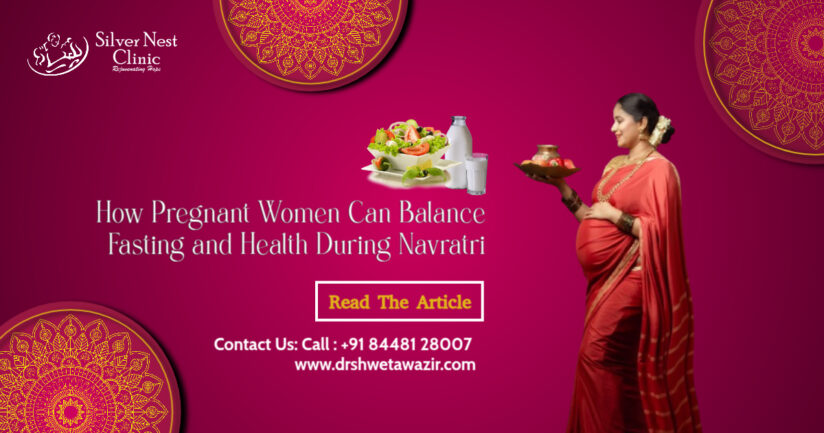Navratri is a cherished festival in India nine nights of spiritual devotion, fasting, and celebration. For pregnant women, however, observing fasts during Navratri requires careful planning and medical guidance. Your well-being and the baby’s development come first. With proper nutrition, hydration, rest, and medical supervision, many expectant mothers can observe Navratri rituals without compromising health. The key is balance.
Understanding the Risks: Why Pregnancy Fasting Needs Caution
Fasting while pregnant is not a one-size-fits-all practice. Several medical studies have shown that in healthy pregnancies, short periods of fasting may be tolerated without increasing risks of preterm birth or low birth weight. However, the risk is higher in pregnancies with complications like gestational diabetes, hypertension, anemia, or fetal growth concerns.
Other risks include:
- Dehydration: Particularly dangerous when fasts are long and fluid intake is restricted. It can affect amniotic fluid levels.
- Hypoglycemia (low blood sugar): Can lead to dizziness, fatigue, nausea. Frequent and balanced meals help mitigate this.
- Nutrient deficiencies: Protein, iron, calcium, folic acid are especially important during pregnancy. Missing these can impact both mother and fetus.
- Physical fatigue and stress: Navratri involves rituals, prayers, sometimes dance (Garba), late nights, and physical exertion. Excess physical activity while fasting can be harmful.
Given these potential dangers, pregnant women must make informed choices if they decide to fast during Navratri.
When to Fast: Pregnancy Stage & Medical Advice
The trimester matters a lot:
- First trimester: This is a critical period for organ formation. Many medical experts caution against fasting during this time due to high risk of nutrient shortfall.
- Second trimester: The body is more adapted; fasting may be safer if the mother has no complications, and with proper nutrition.
- Third trimester: Growing baby’s demand for nutrients increases; hydration becomes more critical. Fasting long hours may be difficult and risky.
Before fasting, consult your obstetrician or gynecologist. Inform them about your health status: hemoglobin levels, blood sugar, any existing conditions. Let them guide with personalized assessment.
Guidelines for Safe Fasting During Navratri for Pregnant Women
If cleared by your doctor, here are evidence-based practices to balance fasting with health:
1. Hydration is Key
- Drink plenty of fluids during non-fasting hours. Water, coconut water, buttermilk (chhaas), and fresh fruit juices are excellent.
- Avoid caffeinated or highly sweetened drinks, which can cause dehydration or sugar spikes.
2. Small, Frequent, Nutrient-Dense Meals
- Break fast with light, easily digestible items (e.g., fruits, dates) to gently restore energy.
- Pre-fast meal should include slow-release carbs (whole grains, millets, sabudana, rajgira), protein (paneer, lentils, eggs if allowed), and healthy fats (nuts, seeds).
- Eat smaller meals or snacks every 2-3 hours during periods when eating is allowed to avoid long gaps without nutrition.
3. Choose Quality Foods Over Quantity
- Include foods rich in iron (leafy greens, legumes), calcium (dairy, paneer), folic acid (green vegetables, fortified foods).
- Use ingredients customary during Navratri that are nutritionally beneficial – for example, millets, sabudana, rajgira.
- Limit fried, oily, spicy, and processed foods. They may upset digestion and increase discomfort.
4. Rest, Sleep, and Moderate Physical Activity
- Adequate sleep (7-8 hours) becomes even more crucial. Short naps during the day if needed.
- Avoid strenuous activity, heavy lifting, prolonged standing, or intense dancing. If participating in Garba, do so for short durations and wear comfortable footwear.
Warning Signs: When to Stop Fasting Immediately
Even with all precautions, pregnant women must be vigilant for symptoms that signal danger. If you experience any of the following, break the fast immediately and consult your healthcare provider:
- Dizziness, blurred vision, or fainting
- Rapid heartbeat, shortness of breath, or sweating
- Severe nausea, vomiting, or inability to keep fluids/food down
- Reduced fetal movements, unusual pain, vaginal bleeding
- Dark coloured urine, signs of dehydration or urinary tract discomfort
Sample Meal Plan During Navratri for Pregnant Women
Here is a suggested day plan (tailor according to your dietary permissions and doctor’s advice):

Special Considerations: Medical Conditions & Trimester-Specific Advice
- Gestational Diabetes: Must monitor blood sugar regularly if fasting. Adjust diet, possibly medications, under medical supervision.
- Anemia or Low Hemoglobin: If already diagnosed, fasting may worsen iron deficiency. Prioritize iron-rich foods, possibly supplement as prescribed.
- High-risk Pregnancy (e.g. history of preterm labor, hypertension, restricted fetal growth): Fasting may be inadvisable. Doctor might recommend partial or no fasting.
Psychological, Spiritual, and Emotional Well-Being
Fasting during festivals like Navratri is not just physical it involves spiritual and emotional dimensions. Maintaining mental well-being is vital:
- Practice meditation, light prayer, or breathing exercises to reduce stress.
- Avoid overcommitment — festival preparations can be draining. Delegate tasks where possible.
- Keep positive company; support from family/friends helps when you feel weak or tired.
Contact & Professional Support
If you are pregnant and considering fasting during Navratri, consulting a qualified obstetrician or healthcare provider is essential. At Dr. Shweta Bansal Wazir’s clinic, we offer personalized counselling, nutritional guidance, and pregnancy support tailored to each trimester and health condition.
📞 For appointments, call +91 84481 28007
Conclusion
Navratri is a time of devotion, joy, and spiritual connection. For pregnant women, observance of fasts can be possible, but only when balanced with medical wisdom, proper nutrition, hydration, rest, and self-awareness. Prioritize your health and your baby’s development above all. Fasting shouldn’t become a source of stress; instead, let it be a time of mindful celebration where faith and wellness walk hand in hand.


Leave A Comment